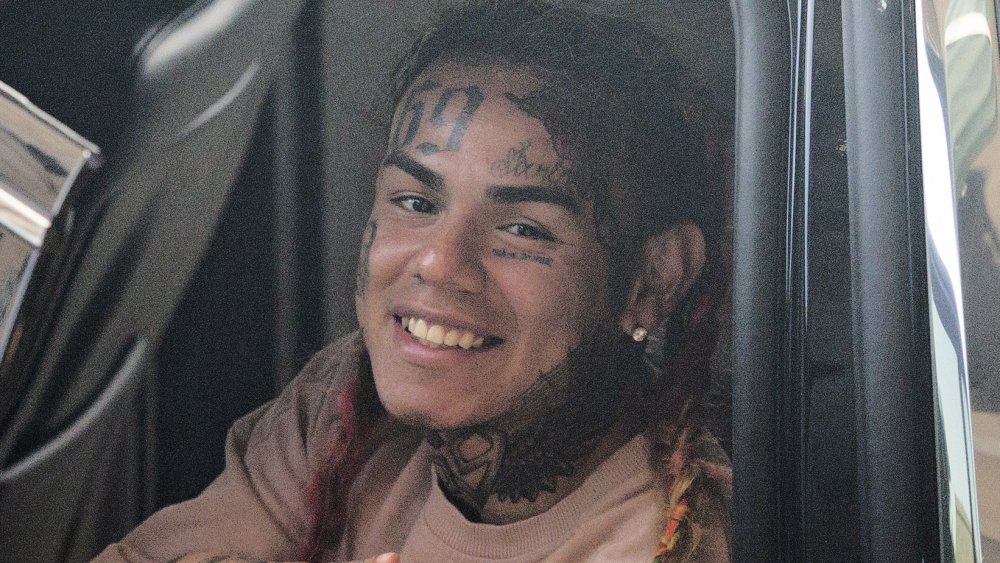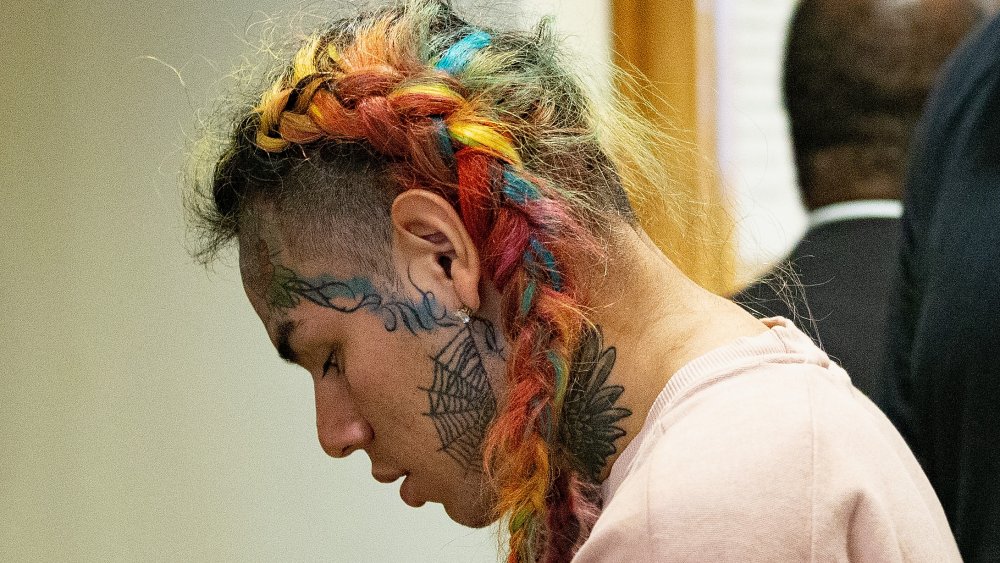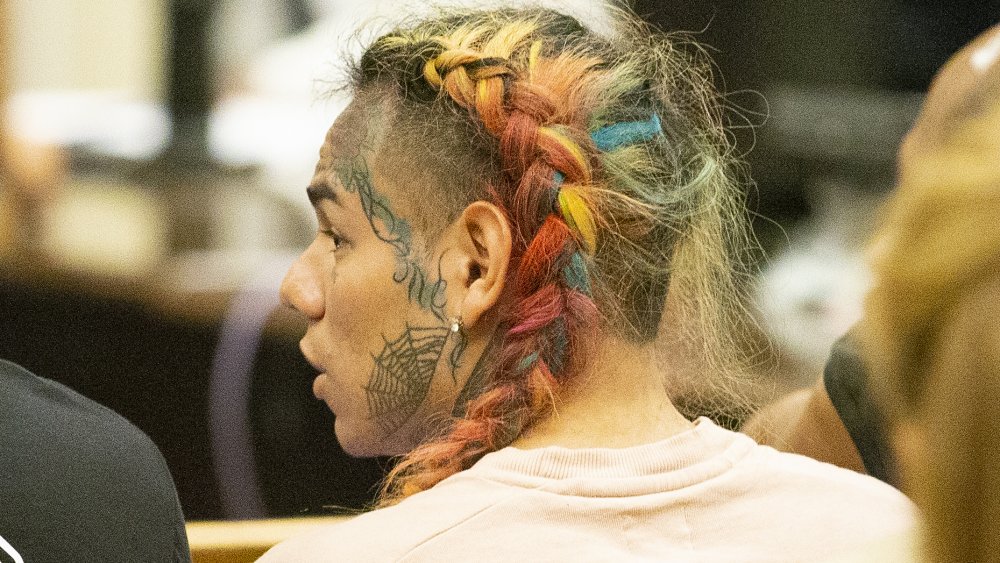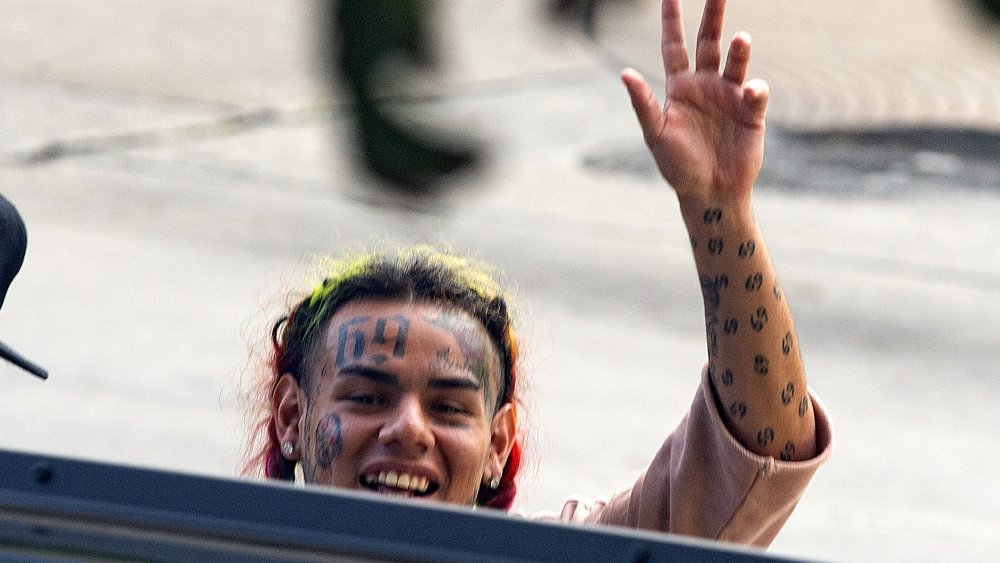What Home Confinement Will Really Be Like For Tekashi 6ix9ine
It looks like rapper Tekashi 6ix9ine won't be serving out the last four months of his prison sentence behind bars. On April 2, 2020, U.S. District Judge Paul A. Engelmayer ordered the rapper (real name Daniel Hernandez) to be released from a private prison in Queens, New York, according to the Associated Press.
The reason? The risk of catching the novel coronavirus – a pandemic which has over one million diagnosed cases worldwide as of this writing — for which 6ix9ine has a greater risk of contracting due to an underlying condition. "In light of the heightened medical risk presented to Mr. Hernandez by the COVID-19 pandemic, there are extraordinary and compelling reasons to reduce Mr. Hernandez's sentence," Judge Englemayer said on his decision to transfer 6ix9ine to house arrest.
But what will home confinement actually look like for the hip-hop artist? And what will he or won't he be able to do under the condition of house arrest?
Tekashi 6ix9ine isn't home-free yet
Tekashi 6ix9ine isn't exactly home-free yet (pun intended, with no apologies). Even though the rapper has already been placed on home confinement, he'll have a few more restrictions than the average New Yorker under coronavirus self-quarantine.
According to attorney Jason Goldman, who spoke with Complex on what house arrest will look like for 6ix9ine, specifically, the rapper will only be granted permission to leave his house to see either his lawyer or a doctor (which means no quick trips to Duane Reade or Fairway Market to stock up on quarantine groceries).
Additionally, the rapper will be required to wear an electronic monitoring device — an ankle bracelet with GPS — so that law enforcement will be able to check that he's home at all times and not breaking the terms of his release. "He's going to have someone he's checking in with regularly," Goldman told the outlet. "Probably someone doing home visits regularly — if not daily, probably weekly."
Could Tekashi 6ix9ine land in hot water again?
So his ankle bracelet will definitely be put to good use, but will Tekashi 6ix9ine be able to use any other electronic devices, like a smartphone or a computer? Attorney Jason Goldman told Complex that 6ix9ine will probably get "limited devices." However, "even those devices, he might be put on notice that they'll be monitored," Goldman said. "It's just about as tight as you can get." On the subject of whether or not the rapper will be able to make music during the remainder of his sentence, Goldman wasn't entirely sure, calling it a "unique circumstance."
"Obviously whoever's counseling him would make sure that doesn't touch upon anything having to do with this case or the buildup to this case." Goldman said, once again highlighting the limitations of 6ix9ine's access to electronic devices. "But if it doesn't, then I don't see why, from his home, he can't be working in that capacity."
And what about using social media, like Instagram? Or recording video? It seems like the same goes for all that as well, as long as 6ix9ine doesn't use it for anything illegal. Case in point? Back in 2015, he was arrested and pled guilty to three counts of "use of a child in a sexual performance" after "three social media videos" surfaced featuring the rapper and another man with a 13-year-old girl, per Billboard.
Is Tekashi 6ix9ine an exception to the rule?
In April 2020, Tekashi 6ix9ine was officially granted early release and placed on home confinement, but it's hardly the same for others in his position. According to a memo released by Attorney General William Barr in March 2020 (via The New York Times), normally, immunocompromised offenders who are transferred to house arrest due to risk of COVID-19 still have to undergo a 14-day quarantine period within prison facilities before being released from custody.
Since the memo, hundreds of inmates who are either over the age of 65 or who have underlying conditions that make them more susceptible to catching the novel coronavirus (in 6ix9ine's case, asthma) have been released from federal prisons, where close quarters have made it possible for the disease to spread quickly.
The majority of these offenders are incarcerated due to non-violent offenses, which also makes 6ix9ine an exception to the rule. In December 2019, the hip-hop star was sentenced to two years in prison for violent gang-related activity, assisting in armed robbery, and attempted murder, per CNN. At the time of his arrest, he faced up to 37 years in prison, but plead guilty to lesser charges — including racketeering — after agreeing to cooperate with authorities as a witness against his cohorts in the Nine Trey Gangsta Bloods.




